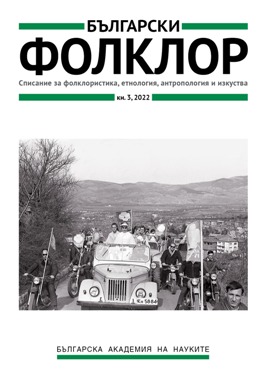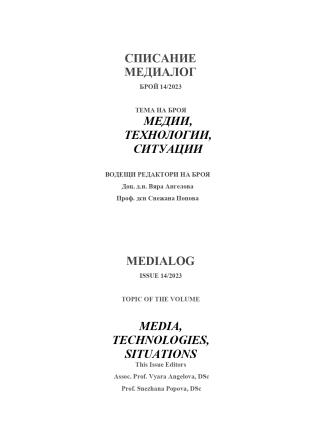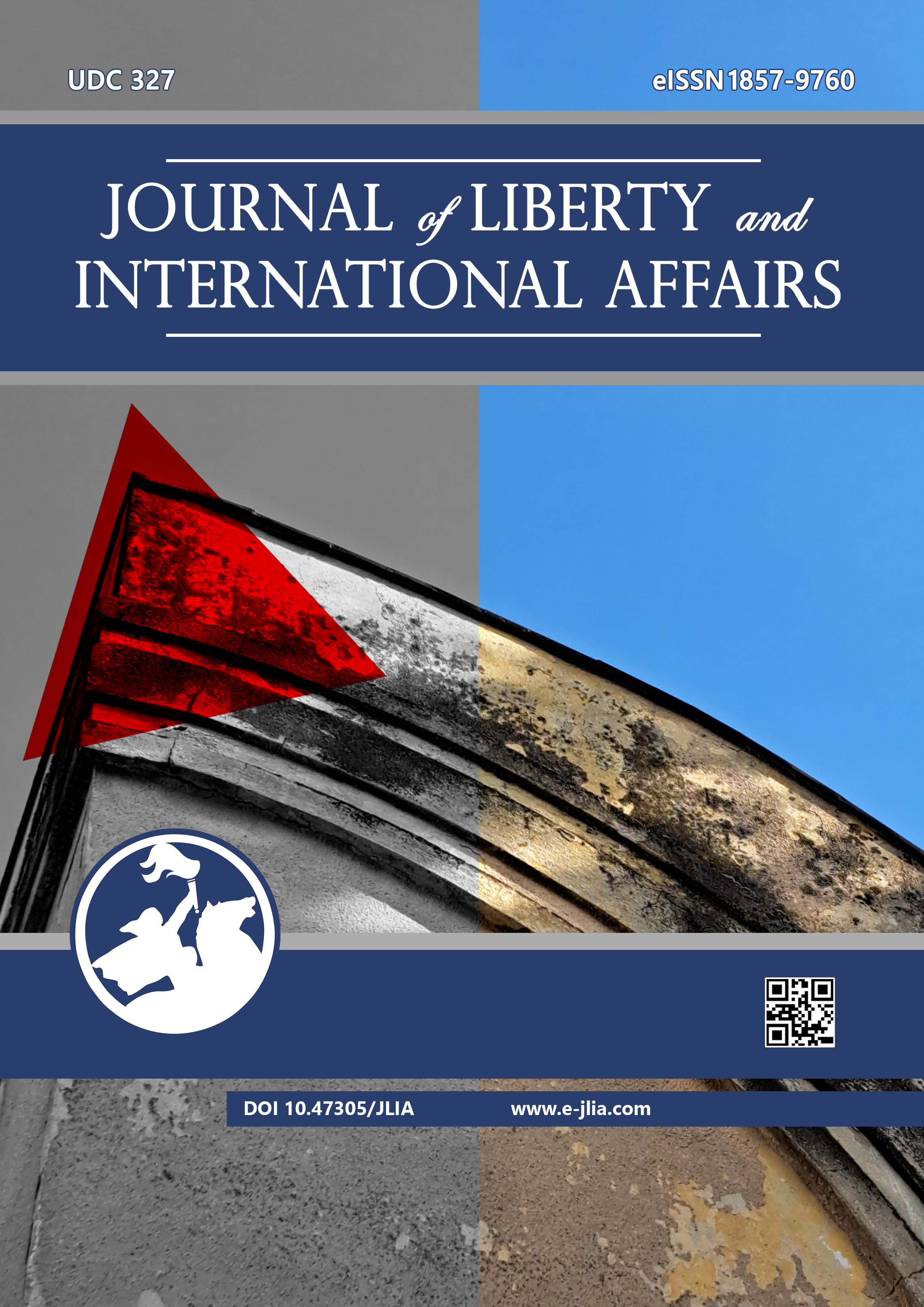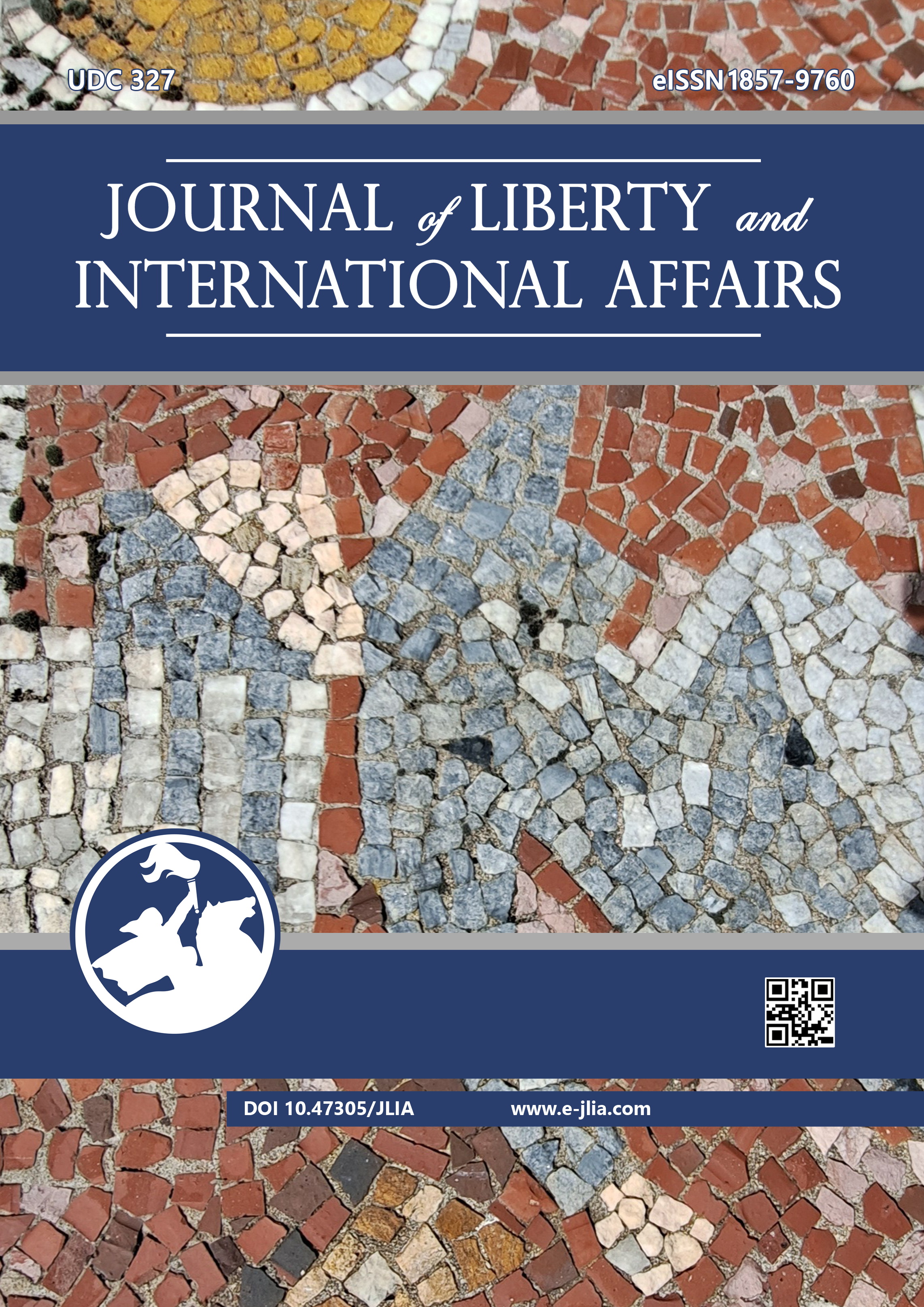
We kindly inform you that, as long as the subject affiliation of our 300.000+ articles is in progress, you might get unsufficient or no results on your third level or second level search. In this case, please broaden your search criteria.


This article examines the imperfections of the Bulgarian media system, which periodically manifest as media crises. The research method used is a case study. The case, which is described and placed in a media and political context, is related to the suspended broadcast of the "Horizon" program on the Bulgarian National Radio on September 13, 2019. The analysis is based on the documents collected in Vyara Angelova's book "#Who stopped BNR", normative acts issued by Bulgarian and European institutions, scientific and media publications on the subject. The conclusions reached by the research are that the media system in Bulgaria is in an unfinished process of transformation. A specific feature of the media environment is that partial elements characteristic of free societies are noticeable. But the factors that dominate bring the Bulgarian media system closer to the authoritarian model defined by Fred Siebert, Wilbur Schramm, and Theodore Peterson.
More...
The rational choice institutionalism approach provides insight into political parties’ personal and institutional preferences in determining their strategic and technical-operational decisions. Institutional and personal preferences in political parties have shaped rational choices in selecting regional head candidates. Political party preferences provide rational choices based on the values they believe have shaped political responses to individuals and institutions. This study will examine selecting mayor and deputy mayor candidates in regional head elections. This study maps the preferences of political parties in determining their rational choices. The qualitative research method involves field interviews, online media analysis, and the examination of social media data. The data processing includes content analysis conducted using NVivo 12 Plus software. The study results indicate that political parties as political institutions are very centralized and pragmatic in determining the results of selecting regional head candidates. There are variations in the types of preferences of political parties in the candidates, namely systemic, practical, and normative preferences. Internal regulations support systemic preferences, practical preferences are determined by party procedures, directors, and selection criteria, and normative preferences are based on political parties’ ideology, values, and goals. Normative preferences will only become mainstream in the candidacy of political parties if party ideology strengthens and the candidate selection mechanism is transformed into a democracy-based selection.
More...
Territorial development disparities are an undeniable reality for all the countries of the world, which implies that no country can practically avoid them. However, how different countries respond to these disparities is another matter. The effectiveness of policies in overcoming territorial development disparities depends significantly on how deeply these disparities are recognized and studied. In this context, assessing disparities in territorial development is necessary, and the article proposes a methodology for its implementation. The methodology examines territorial development indexes and their relative standard deviation. In the article, the developed methodology was also applied to 10 countries, as a result of which the levels of territorial development disparities in Canada, Poland, Bulgaria, Hungary, Finland, Serbia, Georgia, Moldova, Kazakhstan, and China were evaluated. Based on the assessments, general conclusions are also presented for each country in the article.
More...
The objectives of this paper were to assess the role of the EU in the countries willing to join and committed to the negotiation processes (with a particular focus on the WB region) and to explore further and explain the dynamics of the EU’s crucial role onto the political performance, summarizing internal and external country and region-based developments. For this purpose, the deployed methodology consists of conducting a comparative quantitative analysis, comparing evidence from selected countries and from selected enlargement waves. The main results of the analysis confirmed that the EU’s role in ensuring democratic performances at the country/region level is seriously weakened over time and that it is therefore essential that the EU, especially in uncertain times, rethink and revitalize its democracy-promoting mechanisms to rebuild and re-test itself as a transformative power.
More...
ASEAN countries are considered significant contributors to global pollution, particularly concerning marine plastic pollution (MPP), which has emerged as a critical concern in the region. To address this issue, ASEAN has established three specific instruments: the Bangkok Declaration on Combating Marine Debris in 2019, the ASEAN Framework of Action on Marine Debris 2019, and the ASEAN Regional Action Plan for Combating Marine Debris in the ASEAN Member States 2021-2025. However, being soft laws, these instruments lack legally binding force, allowing states to choose not to implement them effectively and promptly, leading to low compliance rates. The root cause of this compliance challenge lies in the ASEAN Way’s foundational principle, which promotes non-intervention, resulting in non-legally binding instruments. This raises genuine concerns about the potential inefficacy of implementing ASEAN instruments. Nonetheless, the issue of marine plastic pollution is considered a contemporary environmental catastrophe in the region, demanding Member States to prioritize compliance. Hence, this study delves into two key issues: (1) the ASEAN Way and compliance and (2) regional mechanisms to bolster Member States’ adherence in combating marine plastic pollution.
More...
The emergence of over-the-top (OTT) services has lately revolutionized the way people consume media content. These services have emerged as a significant disruptor in the media industry in recent years. With the advent of OTT platforms, various concerns have arisen over the censorship and regulation of content on these platforms. Accordingly, this paper has examined the current trends in censorship and regulation of OTT content through the perusal of various legal and regulatory frameworks in the United Kingdom, India, and China. It has probed into cases of censorship and examined various aspects of civil and political liberties. The analysis has revealed a persuasive connection between the degree of freedom of expression and creative freedom dispensed in each region. Lastly, the paper has provided recommendations for policymakers and other stakeholders on balancing the need for freedom of expression and access to information with responsible content management and regulation.
More...
The Eastern Mediterranean is an area of strategic importance not only in the peripheral but worldwide. In recent years, the field of the Eastern Mediterranean has entered a new dynamic since there are trends of Tripartite Partnerships between neighboring states. These partnerships are political, cultural, economic, energy (due to the hydrocarbon surveys), immigration, and especially at the level of dealing with common security threats. By conducting tripartite partnerships, Greece achieved balance while playing a major role in the region. The study examined this Greek initiative in the sectors above under the vacuum left by the great powers (Russia and the USA). Greek foreign policy, through Tripartite Partnerships, defended its strategic interests and shaped the region’s good relationships. The analysis of this policy employed the theory of neoclassical realism in order to present the international and internal (state) system and their impact on the Greek initiative of tripartite cooperation with the states of the Eastern Mediterranean. According to said method, a recommended policy for Greek strategic interests was designed, which may be utilized by other regional states.
More...
The European Union has been the dominant trade partner of Western Balkan countries for a long time; however, China’s trade and economic influence in the region is growing yearly, and its engagement in the region has intensified after the launch of the Belt and Road Initiative. Serbia is the region’s most important strategic trading partner for the EU and China. This paper addressed the trade presence of the EU and China in Serbia, examined the trade position of the EU and China in Serbia, the intensity of their mutual foreign trade (TII index), and the trade competitiveness of Serbia’s export in selected traded commodities (RCA1 index). The trade position of the EU in Serbia was confirmed as clearly more substantial than that of China, and trade intensity was high. However, China’s trade position grew despite its trade exchange intensity, which was well below potential. However, the low values of Serbia’s competitiveness index are a severe obstacle to the increase of Serbian exports and some persistent obstacles in the framework of export procedures. The growing passive trade balance in relations with China remains also disturbing.
More...
This paper aims to analyze the Europeanization of Albanian public administration in light of opening negotiations. The main research question is whether and to what extent Albanian public administration can approximate domestic legislation and ensure effective implementation. The core methodology in this paper is the traditional legal doctrine, which is based on analyses and interpretations of the EU acquis and Albanian legislation with a specific focus on reforming public administration. A reference to secondary sources in the Europeanization of public administration enriches the study. The paper argues that Albania has improved the legal framework for public administration in compliance with the EU acquis. However, it fails to ensure the proper implementation due to the following challenges: i) politicized bureaucracy, ii) the lack of capacity, iii) lack of public consultation with stakeholders, and iv) the inability to put in sound planning mechanisms and to carry out a realistic assessment. The paper concludes that Albania must establish a professional public administration with sufficient knowledge of EU acquis and adequately qualified staff to harmonize the domestic legal system and ensure proper implementation.
More...
After becoming the Prime Minister of India, Narendra Modi made many efforts to consolidate his dominance in South Asia and expand India’s influence in the Indian Ocean. The “neighborhood first policy” was highlighted in India’s foreign policy. Based on historical and logical research methods and studies in international relations, the paper aims to examine the implementation of “neighborhood first policy” through bilateral relations between India and its neighboring countries. These relationships have been facing challenges from the more profound influence and interference of China as well as frequent terrorist incidents due to border disputes, which threatened regional security. Although this policy connected India with its neighboring South Asian countries, there were still challenges. It can be seen that the “neighborhood first policy” was Prime Minister Modi’s effort to nurture bilateral relationships, enhance regional connectivity, and strengthen and elevate India’s position in the region. The progress of the “Neighborhood First” policy is expected to continue more successfully in the next phase.
More...
The EU-facilitated dialogue between Kosovo and Serbia, from its inception until today, has not realized the anticipated expectations and specified goals. Despite more than a decade of diverse engagement approaches by the involved parties, the situation remained precarious. The disputing parties persisted in their respective demands. Conversely, the facilitator/mediator primarily adhered to abstractly proclaimed declarations concerning integration perspectives rather than formulating instruments, measures, and strategies that could be imperative for a final settlement. The Russian aggression in Ukraine further complicated the dialogue, elevating the significance of geopolitics in the process. This paper aims to offer insights into the Kosovo-Serbia dialogue, emphasizing key factors and circumstances crucial for stability and the EU integration of the Balkans. The Franco-German proposal, recognized as an official EU document, holds particular importance. To achieve the paper’s objectives, the authors employed the methods of legal analysis, teleological analysis, description analysis, logical analysis, and comparative analysis.
More...
The Indo-Pacific has partially replaced the term Asia-Pacific and emerged as a geo-economic and geostrategic concept over the last decade, with Japan, Australia, the United States, and India launching their respective plans. As a resident power and a long-time partner, France seized the opportunity. In May 2018, the French Indo-Pacific strategy was initiated during President Macron’s state visit to Australia and released as an official document a year later, making France the first European power to adopt such a strategy. To unveil the driving forces behind French policies and the roles of France in the region, this article employs major theories in international relations (realism, liberalism, and constructivism). In particular, the authors analyze France’s tactical actions concerning like-minded partners and a rising China, addressing how France can protect its interests and amplify its leverage in the region amid Sino-American tensions. The paper specifies several differences between the French approach and other major countries. Last but not least, given the importance of the Franco-ASEAN links mentioned in Section Three of the official strategy, the article also clarifies recent developments in their relationship, focusing on the role of Vietnam in France’s overall scheme.
More...
This paper aimed to analyze how Brazil and India faced the challenge of a large amount of personal information being exchanged, stored, and analyzed. The relevance lies in the fact that data protection and privacy were concepts discussed almost everywhere in the world since the era of Big Data highlighted the challenge of protecting these fundamental rights. Therefore, the research problem was to analyze to what extent these countries effectively faced the challenge presented. The methodology used was exploratory and hypothetical-deductive. As a result, it was identified that the rights to privacy and personal data were not absolute and had to be balanced with other social interests, such as public security, law enforcement, and freedom of expression. It was concluded that inspired by international standards on the subject, such as the Universal Declaration of Human Rights (UDHR), the International Covenant on Civil and Political Rights (ICCPR), and the General Data Protection Regulation (GDPR) of the European Union, both countries had legislative protection over these rights and a framework to address them. The legislation provided fundamental principles, but only time will show their effectiveness.
More...
This research is focused on the ongoing Russian aggression towards Ukraine, which has already resulted in a changed security architecture of Europe and, hence, increased security concerns not only in the region but also facilitated geopolitical shifts globally. Through the prism of exploratory-descriptive qualitative methodology, research strived to analyze the increased geopolitical concerns and challenges for Europe that led to significant changes in the security paradigms of the countries within the EU and increased accountability, as well as reluctance in terms of current security arrangements. Volatile military and political security and economic, social, and transnational challenges emerged as vibrant signs that European and global security will not be the same in the upcoming years.
More...
This study aimed to discuss the legal limbo of Taiwan, whose political situation lies in a grey area of international law. Its legal status is ambiguous: while meeting the characteristics of a State, it is not recognized by other States so long as China claims it as a Chinese territory. The methodology developed in this study adopted the descriptive analytical approach to the different principles of international law, in addition to quantitative methods, which involved gathering data on cases, courts, and resolutions of international organizations, followed by thorough analysis. This research provided an in-depth investigation to critically assess Taiwan’s fragile status quo, threatened by a potential Chinese military intervention. The study found that the idea that Taiwan is deprived of legal status points out the shortcomings of international law. This study concluded that to overcome this tricky situation, Taiwan should take bold moves, such as making constitutional reforms to facilitate its independence.
More...
Since the beginning of the XXI century, the Indo-Pacific region has become the “focus” of strategic competition between the world’s great powers. This area included many “choke points” on sea routes that are strategically important for the development of international trade, playing an important role in transporting oil, gas, and goods around the world from the Middle East to Australia and East Asia. The article analyzed the geostrategic position of the Indo-Pacific region and the strategic adjustments in foreign affairs of some major powers in this region, specifically the US, China, and India. To achieve this goal, the authors used research methods in international relations to analyze the main issues of the study. In addition to reviewing previous scholarly research and reviews, the authors used a comparative approach to assess the interactions between theory and data. The authors believed that these data are important for accurately assessing the strategic importance of the Indo-Pacific region, and this area was an important trigger for the US, China, and India to make adjustments to its foreign policy. If the US proposed a strategy called “Free and Open Indo-Pacific” (FOIP), India’s strategy was called the Indo-Pacific Initiative. China’s Indo-Pacific strategy was clearly expressed through the “String of Pearls” strategy and the “Belt and Road Initiative” (BRI). As a result, in the geopolitical context of the Indo-Pacific region, the competition between major powers (the US, China, India...) is also becoming fiercer and more complex. It has a significant impact on other countries in the region.
More...
This study provided a theoretical framework explaining center-right opposition parties’ evolution in former Eastern Europe. It answered why post-communist center-right parties lacked consistent success and either became marginalized, altered their ideologies, or ceased to exist in the long run. By taking the Democratic Party of Albania as one of the exceptions to the rule and comparing it to the Homeland Union-Lithuanian Christian Democrats, we showed the discrepancy with much of the other center-right parties. We followed a most different systems design, where the dominant center-right party of Albania and the dominant one in Lithuania were compared. Although much different in history, political culture, and institutions, they had similar successful trajectories as dominant center-right parties. We argued that the success of these parties depends upon the durability of party labels as a critical determinant of a party’s success historically, which takes priority over party strategy, mobilization power, social base, and the behavior of the center-right party toward political institutions. Overall, we emphasized party labels as cues of party identification and success.
More...
Russia’s invasion of Ukraine in 2022 triggered a conflict that has transformed international relations through drastic impacts on policymaking, energy politics, and alliances. Such impacts have produced severe multi-dimensional consequences for African countries that have yet to be sufficiently interrogated in the literature. In response to this gap, this paper examined the security implications of the conflict for African countries to offer a comprehensive analysis that considers the intersection of the conflict with contemporary economic, human, social, and political issues confronting Africa. In discourse using a qualitative approach and rooted in a theoretical perspective drawn from the Copenhagen School, the paper underlined the security implications as evident in the areas of food security and governance, buttressing that the proxy conflicts and power struggles associated with this war have exacerbated existing challenges related to food availability and interfered with the consolidation of democracy in Africa. The paper concluded that the war’s multi-dimensional impact potentially compounds political instability vectors. It generates dynamics capable of eroding social cohesion and fomenting social unrest in Africa, meriting its designation as an issue of great concern to African policymakers.
More...
The war in Ukraine brought the collective security system towards a dead-end street. After raising the question of nuclear threat, another long-time forgotten question arises again, waking up the ghosThe war in Ukraine brought the collective security system towards a dead-end street. After raising the question of nuclear threat, another long-time forgotten question arises again, waking up the ghosts that slept for more than a half-century- the use of cluster bombs. Although an international convention prohibits this type of weapon, neither Ukraine, Russia, nor the United States are part of it, which leads back to the agony of fragmentation of international law versus the erga omnes concept of universally applicable norms and customary rules. Since the war is official and intensive, the law of armed conflict applies no matter which of the states involved denies it or names it differently. The use of cluster munitions from both sides is highly contested in international law—the paper aimed to provide an overview of the applicable legal framework through analytical and comparative methods. Although there is a general notion that cluster munition is banned under international law, the paper’s results show this is not the ultimate case. Contextualisation relies on the four basic principles of humanitarian law.
More...